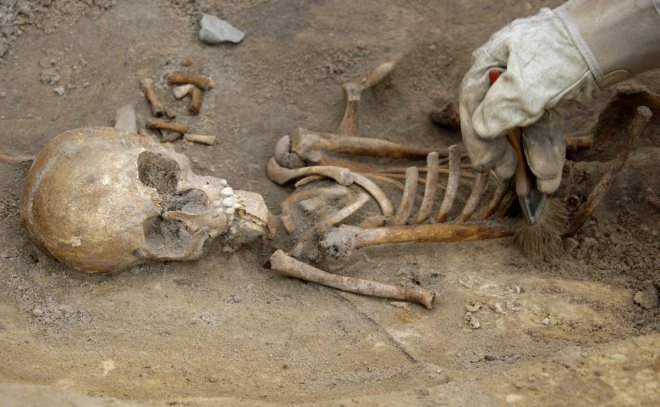
While a group of archaeologists were busy excavating Roman ancient buildings in Europe's Bulgaria region, they suddenly discovered something unexpected. It was a medieval grave of an unidentified ancient human body with an arrow in its chest.
A website called Archelogy in Bulgaria published the report. According to researchers even though they don't know some major facts about the mysterious finding, archaeologists have claimed that this medieval grave represents 11th to a 12th-century timeline.
While the gender of the deceased is still a mystery, according to archaeologists the arrow could be the cause of the death. It may also happen that someone had placed it purposefully as a symbol. According to the reports, it could be possible that the arrow was a ceremonial gift to carry forward into the afterlife, as it was a tradition for warriors in the ancient times.
The excavation took place in the city of Plovdiv in Southern Bulgaria, which is also considered as Europe's oldest city for the prehistoric settlement, fortress on the Nebet Tepe hill and connection to the Rome dominating era, which lasted from 1st to 4th century AD.
Archaeologists from Plovdiv Museum of Archaeology had discovered the mysterious grave amidst the ruins of the Antiquity Odeon, which is an ancient Greek or Roman building built for musical and poetry shows and competitions.
On the other hand, a local news site called Pod Tepeto has revealed that along with the body researchers have also found medieval pottery shards.
Maya Martinova, the lead of this research, who is also an archaeologist and historian at the Plovdiv Museum of Archaeology said, "Early on, in the uppermost layers, we have discovered lots of pottery and a burial, a medieval one. It is interesting that we have found an arrow in the chest [of the buried person]. The burial dates to the 11th-12th century."
"Yet, there is also a custom of placing arrows [in graves] as burial gifts when the person in question is a warrior...We cannot say for sure yet which one it is – whether they were killed by the arrow or whether it was put in the grave – because the bones are not properly arranged," Martinova added.
Before concluding, she further said: "Archaeology is unpredictable. We may stumble upon surprises in every single layer going down from here. Actually, this [place] is a necropolis which was registered decades ago during the research of the entire [archaeological] complex... We have now found one graver from that period."
However, this is not the first discovery of a human skeleton in Europe. According to a report by Newsweek, earlier scientists have found and proceeded a research on ancient human skeletons, died due to stone age plague. The plague wiped out almost the half of Europe's population at that time.









